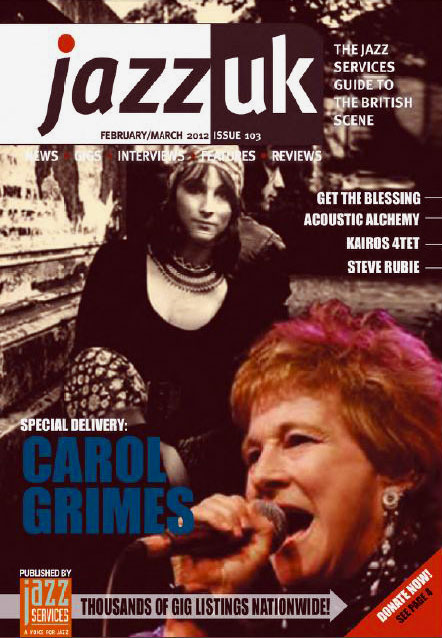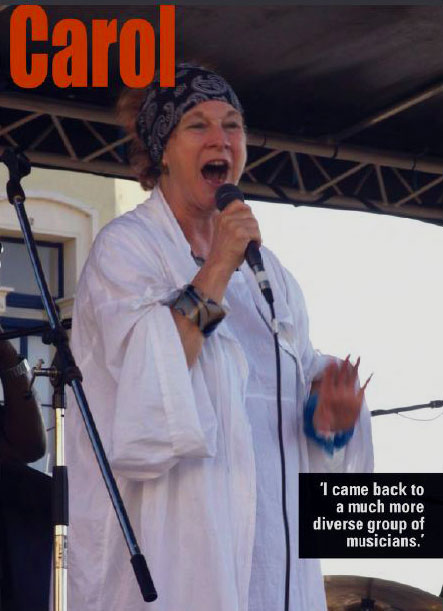A Canterbury Carol
Interview with Brian Blain, Jazz UK March 2012

During a recent Radio 3 Jazz Library broadcast Ian Shaw, discussing the free-flowing beat poetry aspect of Mark Murphy's work, made the observation that the only jazz singer in England who told a story in similar fashion was the 'absurdly undervalued' Carol Grimes. Strange, because whenever I have seen her at North London's Lauderdale House, where I have been organising gigs for twelve years, or the Vortex, the rooms have been packed. So too was Ronnie Scott's on he Oscar Brown night, at the Club's first BritJazz Festival in 2010 and more recently when she presented her Songs of London programme. In 2009 she was an enormous success on BBC Tv's Soul Britannia package alongside Madeline Bell, Linda Lewis and Hamish Stuart. Her website is peppered with enthusiastic postings sparked by a track from his mid-70s album Carol Grimes, with iconic cover of Carol with her young son. The set was recorded in Memphis with the Memphis Horns, including a young Michael Brecker and powered by the legendary electric bass player Duck Dunn.
Carol's back story is incredibly rich, as I discovered when we met. As she put it, 'At bottom I have always been a blue performer and made my way from that towards jazz, while taking in material by Tom Waits, Sandy Denny, Ewan MacColl - oh, loads of people! - as well as writing my own stuff.
She has been 'street' since long before the hip-hop generation imagine they discovered where it was. Her first experience of performance, at the age of 16, was bottling (collecting the money) for Paris Nat, a street busker who knew every nook and cranny in inner London from which a quick exit could be made. It was he who, realising the financial advantage of working with an attractive teenager, persuaded her to sing in public for the first time. On he highly acclaimed 1995 album Mother, 'Blue for Louis', is a fine example of the beat poetry Ian Shaw was alluding to and refers back to her early years and to two more figures who played a significant part in her development; Louis, a conga-playing French-speaking chef from Mauritius and his partner, Pat, who introduced her to the small bohemian multi-racial clubs of the period, giving her the opportunity to sing with bands, to develop her love of the blues and to encounter jazz for the first time: 'The first song that really struck me was Billie Holiday singing 'I Cover the Waterfront'. I still sing it to this day, but to me the waterfront was not some romantic faraway place like New York but the Surrey Docks and Rotherhithe where I grew up. I prefer it when I can relate directly to a song, which is why I later started to write my own, as well as poetry. Now I am working on a book - a kind of Chaucerian 'Singer's Tale' if you like - which is going to be different in will be in audio format and will include tracks that Dorian Ford, my pianist, is recording on our live date, to illustrate stages in the story.'

For those who thing the singer/songwriter is solely a rock convention, Carol points to Oscar Brown Jr: 'Check him out; he is one of my all-time idols. He was a musician, a poet, a songwriter, a political activist who wanted his music to mean something beyond the confines of the club, and he wrote stuff for Cannonball Adderley - what more could you wish from any artist than that?' Harbouring such thoughts no wonder she always seems to have chafed against the restraints of the music business, despite fondly remembered nights at places like Dingwalls, climbing the ladder of rock/blues success to work with bands like Babylon and recording solo albums in Memphis and Nashville. No wonder some visiting American tourists were surprised to see her working at the Vortex a few years ago. To their generation she was a star.
'Yes,' she recalls, 'It was a great to be on the same bill as people like Graham Bond and John Mayall but the touring and some of the people began to get me down. Like, there was a horrible man in the Babylon hon section and all he used to do was tell me I was crap and that I wasn't in the same street as Norma [Winstone]. I didn't even know who she was then and it was only much later that I met her and she was lovely and really supportive.'
Carol's first taste of working with jazz musicians was with Delivery, which included Roy Babbington, Lol Coxhill and various proto-Canterbury School contemporaries. 'That was when I was forced to move away from my r'n'b base and take on new stuff,' she says. 'After taking time out from the rock scene to be with my kids, I came back to a much more diverse group of musicians, many of them part of the new feminist wave around the Guest Stars. I didn't really fit into the jazz scene proper anyway and those musicians were really important in getting me back into performance. Things were inevitably quieter in the 80's and 90's, but it was lucky to become involved in The Shout, a contemporary 'classical' choir organised and conducted by composer Orlando Gough.' This was a high-powered unit which toured extensively across Europe and USA and to Japan. 'It was a wonderful experience and brought another dimensions to my music, but the contrast in fees and conditions to everything I had been used to was remarkable.'
Like may of our top performers Carol became an inspirational teacher; watch out for a sequence in a forthcoming documentary about Barbara Thompson's astonishing fight against Parkinson's Disease, to be shown on BBC4 in which she sings in Sing For Joy, the choir for Parkinson's sufferers that Carol teaches and conducts and of which she says 'I enjoy working with Sing For Joy and there is a strong medical opinion that singing is extremely beneficial for people suffering from the complaint. But most of my work is with young singers at the City Literary Institute, a place with a strong history of jazz teaching. I see the names of my ex-students all over the place and though the world they are going out into - wine bars, restaurants, function bands and the like - is very different to the one where I began, I always insists that they give a performance.' She gives me one of her wicked laughs. 'No matter what you might think, I have never worn a boiler suit! You have to put on a show, but that doesn't mean it has to be insincere or schmaltzy.
Her current band (Annie Whitehead, Dorian Ford, Neville Malcolm and Winston Clifford) is the best that I have heard her work with. Pianist Dorian Ford is a seemingly unlikely figure, with his passion for Keith Jarrett and knowledge of the major classical virtuosi ad their styles, but on the show I saw he dropped in sly references to Monk and Ellington an anyone who knows Tadd Dameron's 'Ladybird', a song version that Carol has recently brought into her repertoire, has clearly got his jazz history sorted. According to Dorian, '...this band is really about grooves and atmosphere. We are on the cusp of jazz, folk and blues if you like, supporting Carol who is a magnificent storyteller.'
Undervalued? Not here.